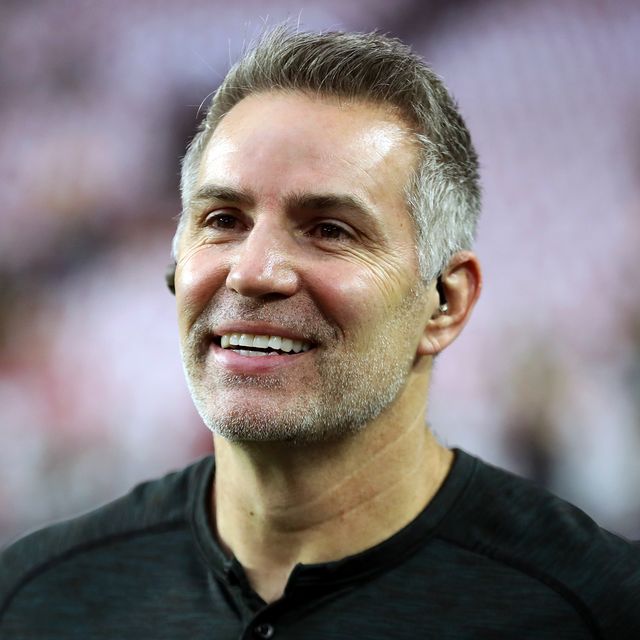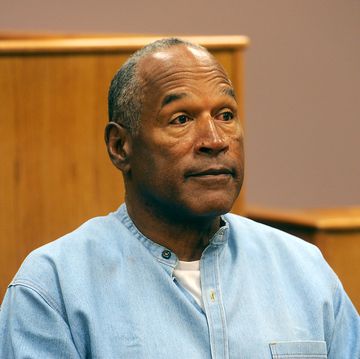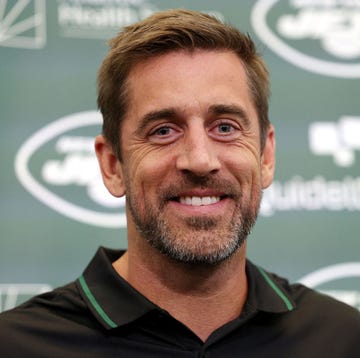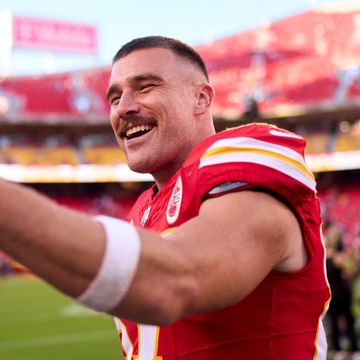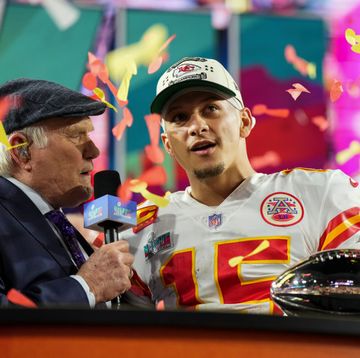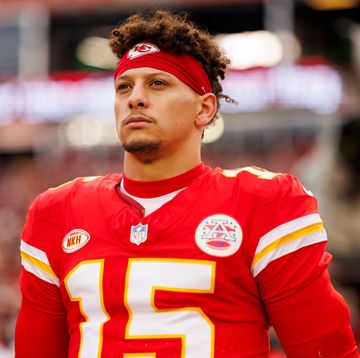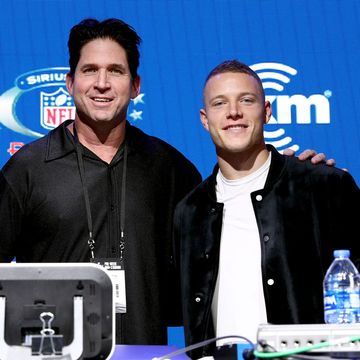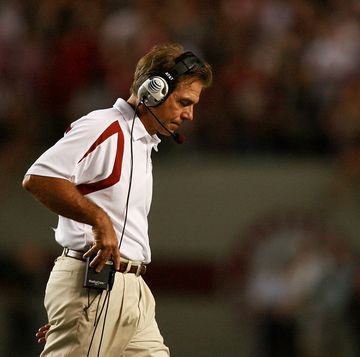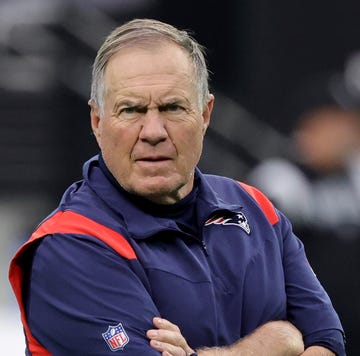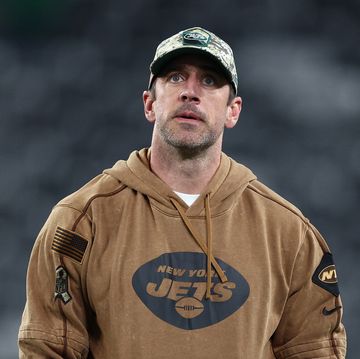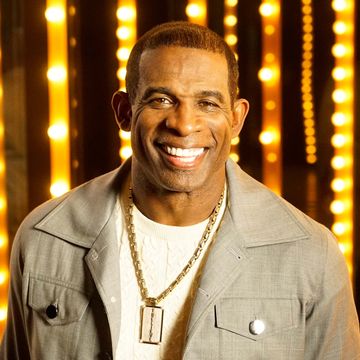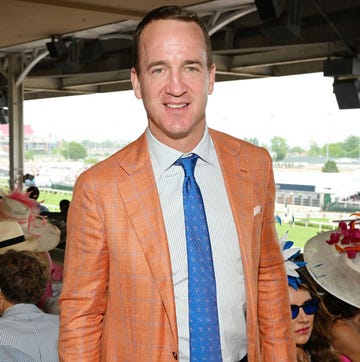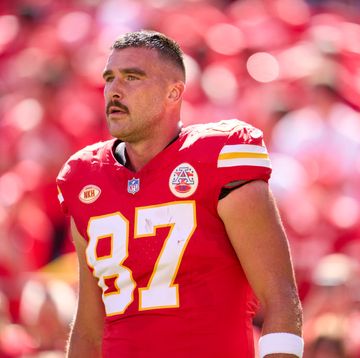1971–
Who Is Kurt Warner?
Kurt Warner's football career has proven to be of the more improbable rags-to-riches stories ever to come out of the sports world. Bypassed by the big Division I colleges, and at one point working the graveyard shift stocking shelves at a supermarket so he could stay in football shape during the day, Warner, a 28-year-old no-name back-up, catapulted to stardom in 1999. During his second full year in the NFL, he drove a high-powered St. Louis Rams offense to a Super Bowl victory and collected MVP honors along the way. Over the ensuing decade, Warner captained two other teams to the Super Bowl, registered another MVP season and threw for more than 200 career touchdowns.
Quick Facts
FULL NAME: Kurtis Eugene Warner
BORN: June 22, 1971
BIRTHPLACE: Burlington, IA
SPOUSE: Brenda Warner
CHILDREN: Kade Eugene Warner, Zachary Taylor Warner, Elijah Storm Warner, Jada Jo Warner, Jesse Jo Warner
ASTROLOGICAL SIGN: Cancer
Early Life
Born June 22, 1971, in Burlington, Iowa, Kurtis Eugene Warner was raised primarily in Cedar Rapids, Iowa, the youngest of two sons born to Gene and Sue Warner, who divorced when Warner was just four. Warner and his older brother, Matt, lived with his mother, who patched things together with a string of low-level jobs, sometimes holding three of them at a time. Warner struggled to forge a relationship with his mother's new husband, whose five-year marriage with Kurt's mom was far from harmonious.
Where Warner found solace was in sports. While attending Regis High School in Cedar Rapids, he excelled in basketball, baseball, and football. After earning the starting quarterback position his junior year, his high school coach, recognizing Warner's on-the-field intelligence, allowed his QB to sometimes call his own plays.
Early Career
By Warner's senior season in 1988 he'd played himself to state honors, earning a trip to Iowa's Shrine Bowl, a game that features the state's top players. There, he led his squad to victory and took home the MVP.
Disappointed by the lack of interest from any bigger college football programs, Warner ended up at the University of Northern Iowa in Cedar Falls, a Division I-AA school that wasn't exactly famous for churning out NFL talent. Initially excited about staying closer to home, Warner's enthusiasm for the college — where he majored in communications — and its football program, waned. After redshirting his freshman year, the quarterback was relegated to the bench for the next three seasons. He thought about quitting, and only stayed on after his parents convinced him.
Finally, in the fall of 1993, Warner took hold of the starting position, leading the Panthers to an 8-3 record, a playoff birth, and conference honors as the Offensive Player of the Year.
Besides earning some long deserved football cred, Warner's time at Northern Iowa was shaped by the meeting of Brenda Meonio, a 25-year-old single mother of two young children, including a son Zach who had suffered a brain injury when he was an infant. Brenda and Kurt quickly grew close, and when they married in 1997, Warner legally adopted his wife's children. Since then, the couple has gone on to have five additional kids, including twin girls born in December 2005.
Despite his senior season success, Warner's dream of playing in the NFL seemed unlikely to be realized following his graduation in 1994. He went undrafted, and while the Green Bay Packers invited him to training camp, the team cut him just five weeks after the signing.
Still, Warner held on to his dream. He took a job in Cedar Falls stocking supermarket shelves for $5.50 an hour, trained during the day at his old college, and told anyone who would listen that he'd be an NFL quarterback some day.
NFL Career
In 1995, Warner was asked to play for the Iowa Barnstormers of the Arena Football League. There, his accurate and strong arm set a host of league passing records and eventually caught the attention of the Rams, a struggling NFL franchise that sent him overseas to play in the NFL's European league in the spring of 1998.
Again, Warner turned in more eye-popping numbers, leading the league in passing yardage and touchdowns. The performance was good enough to help him land the third-string job for the Rams that autumn, a season in which the club turned in a 4-12 record.
Everything changed the following season when, in late August, the team's starting quarterback went down with a season-ending knee injury. In his place, the Rams turned to Warner, who'd played well enough in camp to earn the backup position.
Just as he did in college, Warner came up big, throwing 14 touchdowns in his four games, two more than the team had passed during the entire 1998 season. Football talking heads and fans were enthralled and amazed not only at the quarterback's rise, but also by how the player's talent could be overlooked by so many scouts and coaches.
"There's no way to quantify Warner's commanding pocket presence, his ability to release the ball just before the rush arrives or the amazing array of passes he can throw with chilling accuracy," wrote Sports Illustrated.
Earning a paltry, by NFL standards, $250,000, the league minimum for a second-year player, Warner and the league's highest powered offense, dubbed "The Greatest Show on Turf", sprinted to a 13-3 record and a Super Bowl win in which the quarterback threw for a record 414 yards and was the game's MVP.
"People think this season is the first time I touched a football; they don't realize I've been doing this for years, just not on this level, because I never got the chance," Warner told reporters. "Sure, I had my tough times, but you don't sit there and say, 'Wow, I was stocking groceries five years ago, and look at me now.' You don't think about it, and when you do achieve something, you know luck has nothing to do with it."
Over the next several seasons, Warner, who signed a four-year contract in 2000 for more than $46 million, proved his worth, throwing for more big yardage and touchdowns. He then led the Rams to a second Super Bowl appearance two years later, in which Warner's heavily favored club lost to Tom Brady and the New England Patriots. That same year, Warner captured his second league MVP award.
Off the Field
In a league where a number of players are fairly outspoken about their religious faith, Warner is particularly vocal. In practically every interview, the born-again Christian is quick to credit God not only for his success, but also for determining where he's played throughout the course of his career. In 2001, with his wife Brenda, Warner established First Things First, a charity that helps those in need.
The Warners' generosity extends even to going out to eat. Often, Kurt picks up the check for a family at another table. Warner's kids choose the unsuspecting customers, who are never told who paid their bill. On the field and with the Rams, Warner chose the jersey number 13 as a way to show his disdain for superstition and other things that don't line up with his faith.
Switching Teams
Warner's time with the Rams ended following the 2003 season after injuries, costly turnovers, and a general disintegration of the talent around him put the club in rebuilding mode.
Far from feeling as though his career was over, Warner signed a one-year deal with the New York Giants, who had traded for rookie Eli Manning that spring. The team wanted a veteran quarterback to run the Giants until a younger quarterback was ready to take over. Warner struggled in the club, however, and the Giants went on an eight-game losing streak. Eventually, the veteran QB found himself playing the backup role.
In March 2005, Warner signed a four-year deal with the Arizona Cardinals, a bumbling NFL franchise that had made it to the post-season just once in the last 22 years. After a bumpy three years, in which Warner traded starting duties with Matt Leinart, the former USC standout whom the Cardinals had drafted in 2005, Warner took hold of the position in the fall of 2008. Leading another prolific offense, the 37-year-old Warner steered the club to a 9-7 record, the playoffs, and then on an improbable run to the Super Bowl, where the team narrowly lost to the Pittsburgh Steelers, 27-23. On the big stage, Warner shined once again, throwing for 377 yards and three touchdowns.
In the off-season, Warner, once again a free agent, considered signing elsewhere. He came close to inking a deal with the San Francisco 49ers, but in the end he signed with the Cardinals for a two-year, $23 million deal.
Warner proved he had plenty left in the tank at age 38. He completed 24 of 26 passes in the second game of the 2009 season to set a single-game record for completion percentage, and became just the second quarterback to accumulate 100 touchdowns for two separate teams. After leading Arizona to the NFC West title, he enjoyed one final hurrah by passing for 379 yards and five touchdowns in a thrilling 51-45 playoff win over the Green Bay Packers.
Despite having one year left on his contract, Warner closed the book on his rags-to-riches pro football career by announcing his retirement in January 2010. He joined the NFL Network as an analyst shortly afterward. He was inducted into the Pro Football Hall of Fame in 2017.
QUOTES
“Sure, I had my tough times, but you don't sit there and say, 'Wow, I was stocking groceries five years ago, and look at me now.' You don't think about it, and when you do achieve something, you know luck has nothing to do with it.”
—Kurt Warner
Fact Check: We strive for accuracy and fairness. If you see something that doesn't look right, contact us!
The Biography.com staff is a team of people-obsessed and news-hungry editors with decades of collective experience. We have worked as daily newspaper reporters, major national magazine editors, and as editors-in-chief of regional media publications. Among our ranks are book authors and award-winning journalists. Our staff also works with freelance writers, researchers, and other contributors to produce the smart, compelling profiles and articles you see on our site. To meet the team, visit our About Us page: https://www.biography.com/about/a43602329/about-us
